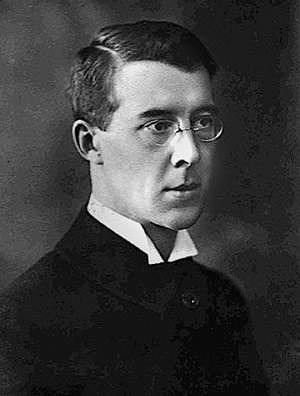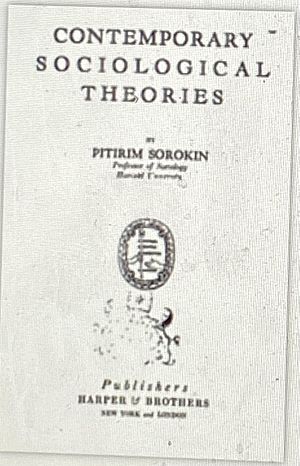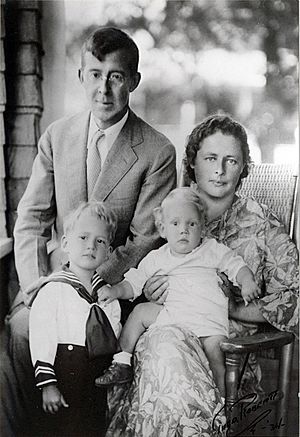Pitirim Sorokin facts for kids
Quick facts for kids
Pitirim Sorokin
|
|
|---|---|
| Питирим Сорокин | |

Sorokin in 1917
|
|
| Born | 4 February [O.S. 23 January] 1889 Turya, Yarensky Uyezd, Vologda Governorate, Russian Empire (now Komi Republic, Russia)
|
| Died | 10 February 1968 (aged 79) |
| Nationality | Russian |
| Citizenship |
|
| Alma mater | Saint Petersburg Imperial University |
| Spouse(s) | Elena Petrovna Sorokina (née Baratynskaya) (1894–1975) |
| Children | Peter Sorokin, Sergei Sorokin |
| Awards | 55th President of American Sociological Association |
| Scientific career | |
| Fields | Sociology |
| Institutions |
|
| Doctoral students | Robert K. Merton |
Pitirim Alexandrovich Sorokin (born February 4, 1889 – died February 10, 1968) was a Russian American sociologist and political activist. He is known for his ideas about how societies change over time, called the social cycle theory.
Contents
- Pitirim Sorokin's Early Life
- Pitirim Sorokin's Political Journey
- Pitirim Sorokin at Harvard University
- Pitirim Sorokin's Inspirations
- Pitirim Sorokin's Works and Interests
- Pitirim Sorokin's Political Views
- Pitirim Sorokin's Connections with Other Sociologists
- American Sociological Association
- Pitirim Sorokin's Impact on Others
- Pitirim Sorokin's Family and Passing
- Images for kids
- See also
Pitirim Sorokin's Early Life
Pitirim Alexandrovich Sorokin was born on February 4, 1889, in Turya, a small village in the Russian Empire. His father was a traveling craftsman who worked with gold and silver. His mother was from a farming family.
When Sorokin was young, his mother passed away. He and his older brother traveled with their father, looking for work. His younger brother was raised by an aunt. Sorokin's childhood was challenging, but he learned strong moral values like kindness and belief in good. These values later influenced his work.
In the early 1900s, Sorokin supported himself as a craftsman. He studied at the Saint Petersburg Imperial University and earned a degree in criminology. He later became a professor there.
Pitirim Sorokin's Political Journey
Sorokin was against communism. During the Russian Revolution, he was part of a political group called the Socialist Revolutionary Party. He was also a helper to the Prime Minister, Alexander Kerensky.
After the October Revolution, when the communists took power, Sorokin continued to speak out against them. He was arrested several times and even faced serious danger. After being in prison for six weeks, he was released. He went back to teaching at the University of Saint Petersburg and started the first sociology department there.
Because he was a leader against the communists, Vladimir Lenin's forces wanted to arrest him again. In 1922, Sorokin left Russia and moved to the United States. He became an American citizen in 1930.
Pitirim Sorokin at Harvard University
In the U.S., Sorokin was asked to join Harvard University. He started the Department of Sociology there. He was known for having different ideas from some of his colleagues, like Talcott Parsons.
Sorokin strongly believed that communism was harmful. Some people saw him as a leader, while others didn't understand his new ideas about change. He was a sociology professor at the University of Minnesota from 1924 to 1929 before moving to Harvard, where he taught until 1959.
Pitirim Sorokin's Inspirations
In 1910, Sorokin was deeply affected by the death of the famous Russian writer Leo Tolstoy. Sorokin studied Tolstoy's ideas about religion and morals. He saw Tolstoy's teachings as a clear and logical way of thinking.
Tolstoy believed that God is the basis of our existence and that love is the way to connect with God. Sorokin learned from Tolstoy the importance of love, non-violence, and not doing evil. He followed these principles throughout his life, and they shaped his work.
Pitirim Sorokin's Works and Interests
Before becoming a professor in the United States, Sorokin wrote a book called Leaves of a Russian Diary (1924). This book shared his daily experiences during the Russian Revolution. He described how he helped create a temporary government in February 1917, and how it later lost power to the Bolsheviks in October 1917. In 1950, he added to this book with The Thirty Years After, which gave an honest look at the revolution and his exile.
Sorokin wrote many academic works, including 37 books and over 400 articles. His ideas about social change and different types of cultures are explained in his major work, Social and Cultural Dynamics (4 volumes, 1937–41). He was also interested in how society is organized into different levels (social stratification), the history of sociology, and how people act kindly towards others (altruistic behavior).
After joining Harvard in 1930, Sorokin began his famous study of world civilizations. This led to Social and Cultural Dynamics. In this work, he criticized what he called "Sensate culture," which he saw as too focused on material things and disorganized. He believed this culture was in danger of collapsing. He spent many years warning people about this danger and looking for ways to improve society.
One of his books, Russia and the United States (1944), was written during wartime. Sorokin argued that American and Russian cultures had much in common. He believed these two nations, which would become major powers after the war, could be friends. He felt both countries showed unity even with different people and ideas.
Sorokin's works are still important today because they opened up new areas of study. He wrote about many topics, including rural life, war, revolution, and social change. He was deeply committed to his religious beliefs, which helped him fight for change and reform.
Social Differences and Society's Layers
Sorokin's work looked at three main ideas: social differentiation, social stratification, and social conflict.
- Social differentiation describes different types of relationships in society. The "familistic" type is one we should aim for. It means people have strong bonds, care about each other's values, and interact a lot.
- Social stratification means that all societies are divided into higher and lower levels. Wealth, power, and influence are not shared equally. People or groups can move up or down these levels, gaining or losing power.
- Social conflict is Sorokin's idea about war. He believed that peace, whether inside a country or between nations, depends on people sharing similar values. War destroys values, and peace begins when some values are rebuilt. Sorokin thought that if societies focused on kindness (altruism) instead of selfishness, there would be fewer wars.
Three Ways Cultures Think
Sorokin's most famous work, Social and Cultural Dynamics, categorizes societies by their "cultural mentality."
- Ideational cultures believe reality is spiritual and not material.
- Sensate cultures believe truth is material, and everything is always changing.
- Idealistic cultures combine both spiritual and material views.
He suggested that major civilizations move from an ideational way of thinking to an idealistic one, and then to a sensate one. Sorokin believed that modern Western civilization was a "sensate" one, focused on technology. He predicted it would decline, and a new "ideational" or "idealistic" era would begin.
Five Aspects of Love
Pitirim A. Sorokin studied altruism, which is selfless concern for others. He said that the energy of love has at least five parts:
- Intensity: How strong the love is.
- Extensity: How many people or things the love includes (from just oneself to all living creatures).
- Duration: How long the love lasts (from a moment to a lifetime).
- Purity: How free the love is from selfish reasons like wanting something in return.
- Adequacy: How well love is shown through actions, matching its true purpose.
In his work "Altruistic Love," Sorokin hoped to find out what kinds of people are likely to be very kind and helpful. He wanted to lay the groundwork for creating more such people to make society better. He studied the lives of saints and "good neighbors" to understand this.
Pitirim Sorokin's Political Views
Sorokin was very involved in politics. He was interested in how power is used fairly and how Russia's democracy worked. He believed that after communism ended, a new Russia would emerge. He also thought that helping Russia through its problems would encourage the world to use altruistic love, which was a key part of his research.
Sorokin also created the Center for the Study of Creative Altruism at Harvard. Here, he developed his ideas about the importance of love and social unity. Through this program, he showed how selfless actions driven by love could help humanity.
Pitirim Sorokin's Connections with Other Sociologists
With financial help from Eli Lilly, a friend and pharmaceutical heir, Sorokin was able to do more research on creative altruism. This research made him well-known and respected by other sociologists. He was even called the "founder of the sociology of altruism." In 1949, he was able to create "The Harvard Research Center in Creative Altruism."
Even though Sorokin and Talcott Parsons worked together, Sorokin often disagreed with Parsons' ideas. Sorokin felt that American civilization was declining, which caused tension between them. Harvard University and the American sociology community often preferred Parsons' views, and Sorokin's leadership position at Harvard was eventually taken away.
Sorokin also focused on rural society, which made him popular with other thinkers who valued traditional ways of life. He worked with Carle Zimmerman to expand on the study of rural and urban sociology. They believed that rural life was based on strong, traditional families, and economies linked to manual labor or family businesses.
American Sociological Association
Pitirim A. Sorokin served as the 55th President of the American Sociological Association. It took a while for him to become president, as many of his peers felt he should have been elected sooner. In 1952, he lost an election. However, in 1963, thanks to his former students and other important sociologists, he was elected president with 65% of the votes.
One of Sorokin's famous works was his presidential speech, called "Sociology of Yesterday, Today, and Tomorrow." In this speech, he talked about how sociology was changing from just discovering ideas to deeply investigating them. He encouraged sociologists to improve older theories and adapt to changes in society. He also looked at how sociology could grow in the future, influenced by cultural systems, social systems, and individuals.
Pitirim Sorokin's Impact on Others
Sorokin influenced the historian Allan Carlson, who agreed with Sorokin's views against communism. Carlson also supported strong family values, agreeing with Sorokin that small, close-knit communities were ideal for families.
Sorokin also influenced Michael Pence, who was the forty-eighth vice president. In 2006, during debates about same-sex marriage, Pence quoted Sorokin. He said, "Marriage matters according to the researchers. Harvard sociologist Pitirim Sorokin found that throughout history, the societal collapse was always brought about following the advent of the deterioration of marriage and family."
In 1961, when the United States and Russia had high tensions, Sorokin wrote to President John F. Kennedy. Sorokin shared his experience with communist leaders. He urged Kennedy to avoid war, believing that true peace would only come when their relationship became genuinely friendly. He also suggested Kennedy read his work, "Mutual Convergence of the United States and the U.S.S.R. to the Mixed Sociocultural type," to help with decisions about the two nations.
Pitirim Sorokin's Family and Passing
Sorokin married Dr. Helen Baratynskaya, and they had two sons, Peter and Sergey. His son, Peter P. Sorokin, helped invent the dye laser.
Pitirim Sorokin suffered from a serious illness for two years. He passed away on February 10, 1968, at the age of 79, in Winchester, Massachusetts. A Russian Orthodox service was held for his family, followed by a service at the Memorial Church of Harvard University.
Today, Sorokin's writings and papers are kept at the University of Saskatchewan in Canada, where people can study them. In 2009, the Sorokin Research Center was opened in Russia to research and publish materials from his collection.
Images for kids
See also
 In Spanish: Pitirim Sorokin para niños
In Spanish: Pitirim Sorokin para niños
 | Ernest Everett Just |
 | Mary Jackson |
 | Emmett Chappelle |
 | Marie Maynard Daly |




